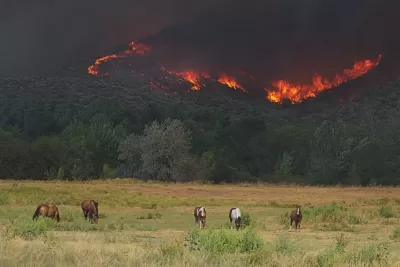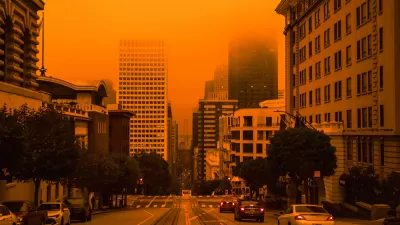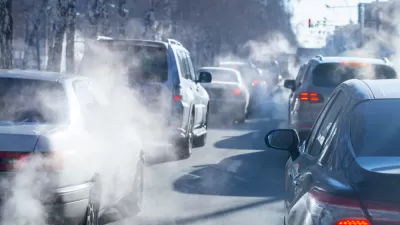Wildfires are consuming forests designated for carbon storage to fight climate change, highlighting the fragility of these carbon offset schemes.

Forests "that are part of carbon-offset projects meant to counterbalance the carbon dioxide pollution being pumped into the atmosphere by human activity" are burning up in the fires consuming the American West, reports Winston Choi-Schagrin. "An estimated 153,000 acres of forests that are part of California’s carbon-offset project have burned so far this summer, according to CarbonPlan, a nonprofit climate-research organization." In Oregon, the Bootleg Fire has claimed nearly 100,000 acres of the Klamath East conservation project.
"California’s carbon offset program works by paying landowners if they commit to managing their land for 100 years in ways that will store more carbon than they would have otherwise. Companies that want to offset their own emissions of greenhouse gases can then buy credits that represent the additional carbon being stored in forests like these."
But "experts say the wildfires have highlighted one of the main weaknesses in the program: the small size of the so-called buffer pool." With the buffer pool, "carbon-offset projects also protect a small percentage of extra land so that if disaster strikes one project, that extra pool of land — with contributions from many different projects — can make up for losses. But too many fires mean that the insurance policy might not be enough." The loss, says Barbara Haya, director of the Berkeley Carbon Trading Program at the University of California, Berkeley, will only increase with climate change.
FULL STORY: Wildfires are ravaging forests set aside to soak up greenhouse gases.

Planetizen Federal Action Tracker
A weekly monitor of how Trump’s orders and actions are impacting planners and planning in America.

Restaurant Patios Were a Pandemic Win — Why Were They so Hard to Keep?
Social distancing requirements and changes in travel patterns prompted cities to pilot new uses for street and sidewalk space. Then it got complicated.

Maui's Vacation Rental Debate Turns Ugly
Verbal attacks, misinformation campaigns and fistfights plague a high-stakes debate to convert thousands of vacation rentals into long-term housing.

Boulder Eliminates Parking Minimums Citywide
Officials estimate the cost of building a single underground parking space at up to $100,000.

Orange County, Florida Adopts Largest US “Sprawl Repair” Code
The ‘Orange Code’ seeks to rectify decades of sprawl-inducing, car-oriented development.

Maui's Vacation Rental Debate Turns Ugly
Verbal attacks, misinformation campaigns and fistfights plague a high-stakes debate to convert thousands of vacation rentals into long-term housing.
Urban Design for Planners 1: Software Tools
This six-course series explores essential urban design concepts using open source software and equips planners with the tools they need to participate fully in the urban design process.
Planning for Universal Design
Learn the tools for implementing Universal Design in planning regulations.
Heyer Gruel & Associates PA
JM Goldson LLC
Custer County Colorado
City of Camden Redevelopment Agency
City of Astoria
Transportation Research & Education Center (TREC) at Portland State University
Camden Redevelopment Agency
City of Claremont
Municipality of Princeton (NJ)





























